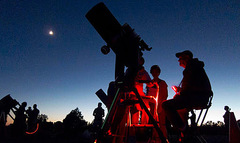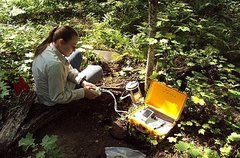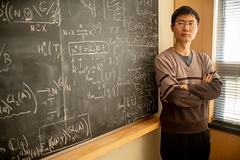Physicists and astronomers study the ways in which various forms of matter and energy interact. Theoretical physicists and astronomers may study the nature of time or the origin of the universe. Physicists and astronomers in applied fields may develop new military technologies or new sources of energy, or monitor space debris that could endanger satellites.
Physicists and astronomers typically do the following:
- Develop scientific theories and models that attempt to explain the properties of the natural world, such as atom formation or the force of gravity
- Plan and conduct scientific experiments and studies to test theories and discover properties of matter and energy
- Write proposals and apply for research grants
- Do complex mathematical calculations to analyze physical and astronomical data, such as data that may indicate the existence of planets in distant solar systems
- Design new scientific equipment, such as telescopes and lasers
- Develop computer software to analyze and model data
- Write scientific papers that may be published in scholarly journals
- Present research findings at scientific conferences and lectures
Physicists explore the fundamental properties and laws that govern space, time, energy, and matter. Some physicists study theoretical areas, such as the fundamental properties of atoms and molecules and the evolution of the universe. Others design and perform experiments with sophisticated equipment such as particle accelerators, electron microscopes, and lasers. Through observation and analysis, they try to discover and formulate laws that explain the forces of nature, such as gravity, electromagnetism, and nuclear interactions. Others apply their knowledge of physics to practical areas, such as the development of advanced materials and medical equipment.
Astronomers study planets, stars, galaxies, and other celestial bodies. They use ground-based equipment, such as radio and optical telescopes, and space-based equipment, such as the Hubble Space Telescope. With these they make observations and collect data on the motions, compositions, and other properties of the objects they study. Some astronomers focus their research on objects in our own solar system, such as the sun or planets. Others study distant stars, galaxies, and phenomena such as neutron stars and black holes, and some monitor space debris that could interfere with satellite operations.
Many physicists and astronomers do basic research with the aim of increasing scientific knowledge. These researchers may attempt to develop theories that better explain what gravity is or how the universe works or was formed.
Other physicists and astronomers do applied research. They use the knowledge gained from basic research to develop new devices, processes, and other practical applications. Their work may lead to advances in areas such as energy, electronics, communications, navigation, and medical technology. Because of these workers, lasers can now be used in surgery and microwave ovens are in most kitchens.
Astronomers and physicists typically work on research teams with engineers, technicians, and other scientists. Some senior astronomers and physicists may be responsible for assigning tasks to other team members and monitoring their progress. They may also be responsible for finding funding for their projects and therefore may need to write applications for research grants.
Although all of physics involves the same fundamental principles, physicists generally specialize in one of many subfields. The following are examples of types of physicists:
Condensed matter physicists study the physical properties of condensed phases of matter, such as liquids and solids. They study phenomena ranging from superconductivity to liquid crystals.
Astrophysicists study the physics of the universe. Astrophysics is a term that is often used interchangeably with astronomy.
Particle and nuclear physicists study the properties of atomic and subatomic particles, such as quarks, electrons, and nuclei, and the forces that cause their interactions.
Medical physicists work in healthcare and use their knowledge of physics to develop new medical technologies and radiation-based treatments. For example, some develop better and safer radiation therapies for cancer patients. Others may develop more accurate imaging technologies that use various forms of radiant energy, such as magnetic resonance imaging (MRI) and ultrasound imaging.
Atomic, molecular, and optical physicists study atoms, simple molecules, electrons, and light, and their interactions. Some look for ways to control the states of individual atoms, which might allow for further miniaturization, or contribute toward the development of new materials or computer technology.
Plasma physicists study plasmas, which are considered a distinct state of matter and occur naturally in stars and interplanetary space and artificially in neon signs and plasma screen televisions. Many plasma physicists study ways to create possible fusion reactors that might be a future source of energy.
Unlike physicists, astronomers cannot do experiments on their subjects because they are so far away that they cannot be touched or interacted with. Therefore, astronomers generally make observations or work on theory. Observational astronomers observe and collect data. Theoretical astronomers analyze, model, and theorize about how systems work and evolve. Some astronomers specialize further into other subfields. The following are examples of types of astronomers who specialize by the objects and phenomena they study:
Planetary astronomers focus on the birth, evolution, and death of planets. They may try to discover planets outside our galaxy.
Stellar astronomers study stars, black holes, nebulae, white dwarfs, and supernovas.
Solar astronomers study the sun. They study the sun’s many complex systems, such as its atmospheres, magnetic field, and they investigate new ways to study it.
Galactic astronomers study the Milky Way galaxy, the galaxy in which we live.
Cosmologists and extragalactic astronomers study the entire universe. They study the history, creation and evolution, and the possible futures of the universe and its galaxies. These scientists have recently developed several theories important to the study of physics and astronomy, including string, dark matter, and dark energy theories.
The following are examples of astronomers who specialize by how they study objects and phenomena:
High-energy astrophysicists study objects or phenomena by collecting and analyzing x rays, gamma rays, and other forms of high-energy rays that can help locate and study black holes or neutron stars.
Optical astronomers use optical telescopes, which collect visible light, to study their subjects. Telescopes that collect visible light often have digital cameras that create an image on computer screens.
Radio astronomers analyze the radio spectrum for data about their subjects. These astronomers often study quasars, which are the high-energy nuclei of distant galaxies, and were the first to find compelling evidence for the Big Bang theory.
Theoretical astronomers generally do not collect data through observation, but analyze large data sets that others collect to create new theories or find new anomalies.
Growing numbers of physicists work in interdisciplinary fields, such as biophysics, chemical physics, and geophysics. For more information, see the profiles on biochemists and biophysicists and geoscientists.
Many people with a physics or astronomy background become professors or teachers.

















